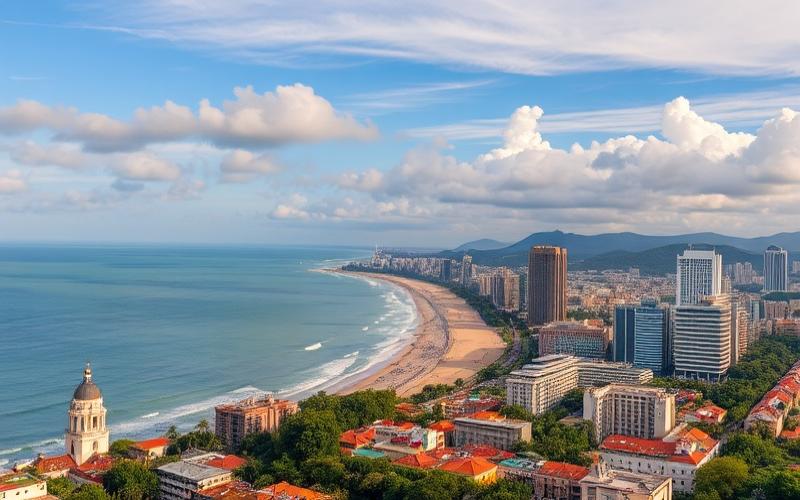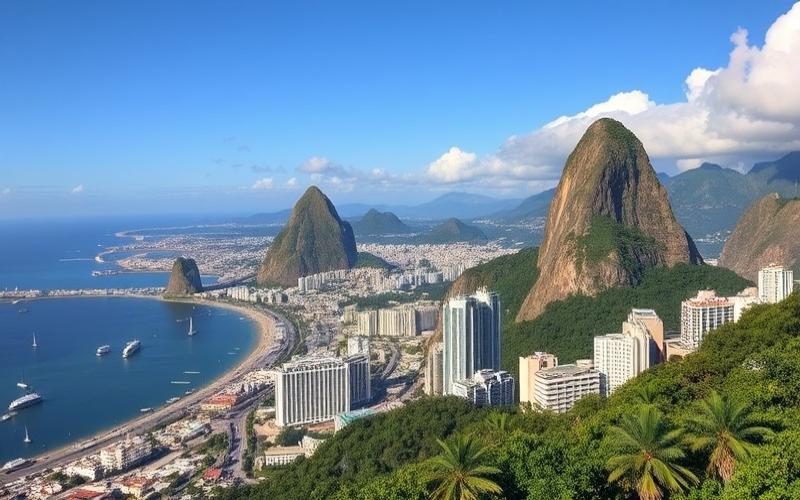
 Published on and written by Cyril Jarnias
Published on and written by Cyril Jarnias
Navigating a new country can be an exciting challenge, especially when it comes to building a strong professional network. Brazil, with its dynamic economy and rich culture, offers expatriates unique opportunities, but the keys to success lie in understanding local specifics and mastering the art of adapting to Brazilian social codes. Learning to decode cultural subtleties, developing authentic relationships, and leveraging appropriate digital platforms are essential elements for optimizing your professional presence. In this exploration, we reveal proven strategies to help expatriates expand their contact circles in this vibrant and promising country.
Identifying Key Networking Events in Brazil
Major Professional Events and Trade Shows in Brazil
| Event Name | City | Industry Sector | Frequency |
|---|---|---|---|
| WTM Latin America | São Paulo | Tourism, Hospitality | Annual |
| ABF Franchising Expo | São Paulo | Franchising, Retail, E-commerce | Annual |
| Beauty Fair | São Paulo | Cosmetics, Health & Wellness | Annual |
| EXPOMAFE | São Paulo | Industry, Industrial Equipment | Biennial |
| ISC Brasil | São Paulo | Industrial Security | Annual |
| Equipotel | São Paulo | Hospitality, Environment | Annual |
| FIPAN | São Paulo | Food Industry, Bakery | Annual |
| INTERMACH | Joinville (SC) | Industrial Engineering | – |
| ENERSOLAR + Brazil & FEBRAVA & CONSTRU METAL & Others* | São Paulo | Various: Solar Energy, Metal Construction… | Variable |
Other active cities:
- Rio de Janeiro: Oil/Gas Sector (EXPOMAG), Food/Restaurant/Hospitality (Jotajá Summit), Medical/Laboratory.
- Salvador: International Business Conferences like SME Summit.
- Belo Horizonte, Curitiba, etc. occasionally host sector-specific fairs.
*For a comprehensive calendar sorted by sector and region, consult dedicated professional fair platforms.
Covered Sectors
- Heavy Industry and Automation
- Renewable Energy
- Health/Biotechnology/Medical
- Retail/Franchising/E-commerce
- Food Industry/Hospitality/Tourism
- Technology/Security/Software
Tips for Optimizing Your Networking at These Events
- Prepare professional business cards in Portuguese or bilingual.
- Develop a clear personal pitch (30 seconds to 1 minute) tailored to the local audience.
- Identify key exhibitors or speakers in advance via the official event website or social media; consider requesting a meeting beforehand.
- Have a digital version of your CV/LinkedIn profile accessible via QR code on your business card.
Platforms for Tracking Event News in Brazil
Useful list:
- Platforms specialized in professional event monitoring:
- Tradefest.io
- Eventseye.com
- Eventbrite.br
- Social Media:
- LinkedIn Events (Brazilian sector groups)
- Instagram/Facebook of main organizers
Staying informed via LinkedIn or WhatsApp often provides access to temporary groups dedicated to specific event participants. Joining before the event facilitates early contact with other expatriates or local professionals.
Recommended Additional Preparation:
- Learn about local protocol (professional dress code often formal in São Paulo).
- Adapt your intercultural communication—favor a warm but concise approach during initial contact.
- Prepare a few key phrases in Portuguese even if you’re not perfectly bilingual; this greatly facilitates initial contact.
Good to Know:
Attend Futurecom in São Paulo for the telecommunications sector or Agrishow in Ribeirão Preto for agribusiness; prepare a compelling pitch and follow events on platforms like LinkedIn to maximize your networking opportunities.
Exploring Professional Associations for Expatriates
Expatriates in Brazil have access to a wide range of professional associations suited to different profiles and sectors. These associations play a key role in professional integration, career development, and understanding the local market.
| Association Type | Notable Examples | Sectors/Specifics |
|---|---|---|
| Major International Associations | France-Brazil Chamber of Commerce (CCFB), American Chamber of Commerce Brazil (Amcham Brasil), British Chamber of Commerce and Industry in Brazil (Britcham) | Multi-sector, Global Networking |
| Sector-Specific Associations | Brazilian Wind Energy Association (ABEEólica), Brazilian Agribusiness Association (ABAG), Brazilian Aerospace Industries Association (AIAB), Assespro – Brazilian ICT Companies Association | Energy, Agriculture, Aeronautics, IT |
| Francophone and International Professional Clubs | Club Pro São Paulo, Rio Pro Network, Club V.I.E Brazil | Francophone/European Expatriates |
| National Expatriate Associations | Français du Monde-ADFE, Union des Français de l’Étranger | Social and Citizen Support |
Essential Roles of Associations for Expatriates:
- Accelerate the creation of professional connections through regular events: multilingual after-work gatherings, career workshops, sector conferences.
- Provide privileged access to local market information, including legal/fiscal advice and sector trends.
- Foster professional development through specialized training or workshops on cultural specifics of doing business in Brazil.
- Enable faster integration via social or sports activities to expand your personal network.
Concrete example of activities offered:
- Workshops on local taxation
- Meetings with local executives
- Peer mentoring sessions with experienced professionals
How to Join These Associations?
Practical list for joining:
- Search for the association matching your sector or language via their official websites or social media.
- Fill out an online membership form; some clubs require a modest annual fee.
- Attend initial open events for non-members to discover the group’s dynamics before final registration.
Additional Tips:
- Active involvement as a volunteer quickly increases your professional visibility in the local network.
- Using dedicated Facebook/Meetup groups like “Expats in São Paulo/Rio/Brasília” also allows for initial informal contact with various communities.
Concrete Benefits of Membership:
- Exclusive access to private networking events
- Invitations to local/international professional trade shows
- Continuing education tailored to the Brazilian context
- Specific documentary resources reserved for members
- Mentoring by experienced professionals already established
Testimonials
“Thanks to Club Pro São Paulo, I was able to bounce back professionally after my arrival. The workshops helped me better understand how the Brazilian market works, and most importantly, I met my future employer at an after-work event.” — Bénédicte H., HR Manager
“Club V.I.E opened all doors for me: I found my first local clients there when I was launching my company. The community spirit greatly facilitates every administrative or business step!” — Paul-Louis H., Digital Entrepreneur
“Joining an international chamber was decisive: that’s where crucial information on local regulations is shared, and also where the relationships that matter for advancing your career here are naturally created.” — Marc T., Renewable Energy Engineer
To maximize professional integration in Brazil as an expatriate, it is highly recommended to explore these different structures, actively register for proposed activities, and most importantly: dare to propose your own ideas/projects to enrich these dynamic networks!
Good to Know:
Joining associations such as the American Society of São Paulo or the France-Brazil Chamber of Commerce can offer valuable opportunities to integrate into the local network and access professional events. Participating in these networks also allows you to gain knowledge about the dynamism of key Brazilian industries like energy and information technology.
Understanding Brazilian Professional and Cultural Etiquette
Importance of Greetings and Introductions
- Greetings are essential: it is customary to shake hands with each person present upon arrival and departure, taking time to establish eye contact. Between women or close male friends, a hug or two kisses on the cheeks may occur.
- Formal presentation is valued: always exchange a business card at the beginning of the meeting, with a Portuguese version oriented towards your interlocutor.
- Avoid any open criticism towards colleagues or former employers during initial exchanges.
Hierarchy and Authority in Professional Relationships
| Aspect | Practice in Brazil |
|---|---|
| Structure | Marked hierarchy, respect for authority |
| Decision | Centralized around the leader or superior |
| Communication | Indirect to avoid confrontation |
- Strictly respect titles and functions; address your interlocutors by their professional title followed by their first name until a more informal relationship is proposed.
- Avoid any behavior perceived as too directive if you are not at a high level in the hierarchy.
Physical Contact (Handshakes, Hugs)
- The handshake is firm but friendly. Maintain eye contact.
- Light touching on the forearm or shoulder during conversation conveys human warmth and trust; do not take offense.
- A hug may occur quickly if the relationship becomes warm. However, maintain some restraint during the very first meetings.
Cultural Particularities Influencing Professional Behavior
Perception of Time
Punctuality is relative: it is not uncommon for your counterparts to arrive 15 to 30 minutes after the scheduled time for social meetings; for business, be punctual but expect possible delays from your Brazilian partners.
Business Meetings
Meetings often begin with informal discussions aimed at getting to know each other better before directly addressing the main professional topic. Be prepared to dedicate time to personal development during these initial exchanges.
Negotiation
| Characteristic | Typical Behavior in Brazil |
|---|---|
| Style | Long negotiation focused on trust |
| Flexibility | Great adaptability |
| Decision | Sometimes slow (hierarchy + consensus) |
Practical tips:
- Never pressure a Brazilian partner for a quick decision; favor patience and diplomacy.
Personal Relationships in Business
Establishing a strong personal relationship often precedes any fruitful professional collaboration:
- To succeed, invest in extended lunches or coffees to create a friendly atmosphere outside the purely professional framework;
- It is common for your network to develop through personal recommendations rather than institutional approaches;
- Show sincere empathy and be open to conversations not strictly professional (family, sports…).
Practical Tips to Avoid Faux Pas
- Always adopt elegant attire suited to the local climate: sober but well-groomed clothing (suit/tie optional depending on sector), impeccable shoes.
- Systematically present your business card translated into Portuguese with the visible side.
- Do not criticize colleagues or previous partners in public or private; maintain reserve even when facing difficulties encountered elsewhere.
- Place great importance on hierarchical respect without immediate excessive familiarity – let this evolution occur naturally according to your Brazilian interlocutor.
- Be patient regarding sometimes lengthy administrative/bureaucratic deadlines.
- Truly invest in your interpersonal relationships: accept convivial invitations with enthusiasm.
To succeed in Brazil:
– Value every human interaction,
– Pay attention to appearance & politeness,
– Develop trust before any business,
– Respect hierarchy & local codes,
– Arm yourself with patience in the face of delays!
Good to Know:
In the Brazilian professional environment, it is crucial to respect hierarchy while cultivating strong personal relationships, as they strongly influence business; favor warm handshakes accompanied by sustained eye contact and do not impose too fast a pace during negotiations, as punctuality is more flexible than in Europe.
Effective Approaches for Building Sustainable Business Relationships
Understanding Brazilian Business Culture and Its Specifics
- Interpersonal relationships are at the heart of professional development in Brazil. Trust, human warmth, and camaraderie take precedence over purely transactional aspects.
- The concept of jeitinho illustrates the Brazilian art of finding flexible solutions, often bypassing administrative or hierarchical obstacles. This adaptability is valued and expected in business relationships.
- Values of collectivity manifest through strong solidarity and the search for consensus. Brazilians prioritize group interest and collaboration.
- Hierarchy remains marked: respect for superiors is essential, and decision-making is often centralized.
Strengthening Communication Through the Portuguese Language
- Learning Portuguese facilitates the creation of trust bonds and demonstrates respect for the local culture.
- Even basic mastery of the language (greetings, polite phrases) helps break the ice and humanize exchanges.
- In some sectors, communication in Portuguese is an unavoidable requirement, especially for direct interactions with local clients or collaborators.
Face-to-Face Meetings and Networking Events
- Physical meetings are fundamental for building lasting relationships. Brazilians place great importance on conviviality and social interaction.
- Networking events (conferences, lunches, after-work gatherings) are privileged opportunities to build connections, exchange informally, and develop mutual trust.
- Personal development, active listening, and demonstrating genuine interest in others are highly appreciated during these encounters.
Comparison with Other Business Practices
| Practices | Brazil | Other Countries (e.g., France, Germany) |
|---|---|---|
| Relational | Priority on personal connection | More task and efficiency oriented |
| Hierarchy | Marked structure, respect for titles | Sometimes more horizontal |
| Communication | Indirect, avoids frontal “no” | More direct |
| Informality | First names used quickly | More formality in initial exchanges |
| Flexibility | Jeitinho valued | More rigid procedures |
Adapting to these differences (consideration of the collective, patience with delays, flexibility in negotiation) is crucial for establishing lasting relationships.
Impact of Local Social Media and Online Platforms
- Social networks (LinkedIn, WhatsApp, Instagram) are essential tools for maintaining relationships, sharing professional news, and organizing meetings.
- Using these platforms to congratulate a contact, share relevant content, or simply check in helps maintain constant connection and demonstrate authentic interest.
Practical Tips for Long-Term Relationship Follow-up and Management
- Send regular personalized messages to check in (birthdays, professional successes).
- Prioritize calls or meetings over emails for important subjects.
- Be attentive to local courtesy: thank, congratulate, show human warmth.
- Respect the response pace and do not insist in case of temporary silence, while remaining available.
Concrete Examples and Case Studies
- A French expatriate, settled in São Paulo, integrated a local professional network by actively participating in sector events and regularly sharing content on LinkedIn in Portuguese. Thanks to this visibility and the quality of his exchanges, he was recommended for major projects.
- A Canadian entrepreneur developed a strong partnership with a Brazilian supplier by taking the time to learn Portuguese, organizing informal lunches, and multiplying exchanges via WhatsApp, thus demonstrating her long-term commitment.
Key Takeaways
Building a strong professional network in Brazil relies on understanding the local culture, investing in human relationships, learning Portuguese, and strategically using digital tools, while respecting the hierarchy and conviviality inherent to Brazilian society.
Good to Know:
Understanding Brazilian culture, especially jeitinho and collective values, is essential for establishing solid relationships; an expatriate succeeded in creating a network by adopting these practices and actively participating in local events while strengthening his Portuguese skills.
Disclaimer: The information provided on this website is for informational purposes only and does not constitute financial, legal, or professional advice. We encourage you to consult qualified experts before making any investment, real estate, or expatriation decisions. Although we strive to maintain up-to-date and accurate information, we do not guarantee the completeness, accuracy, or timeliness of the proposed content. As investment and expatriation involve risks, we disclaim any liability for potential losses or damages arising from the use of this site. Your use of this site confirms your acceptance of these terms and your understanding of the associated risks.


























































